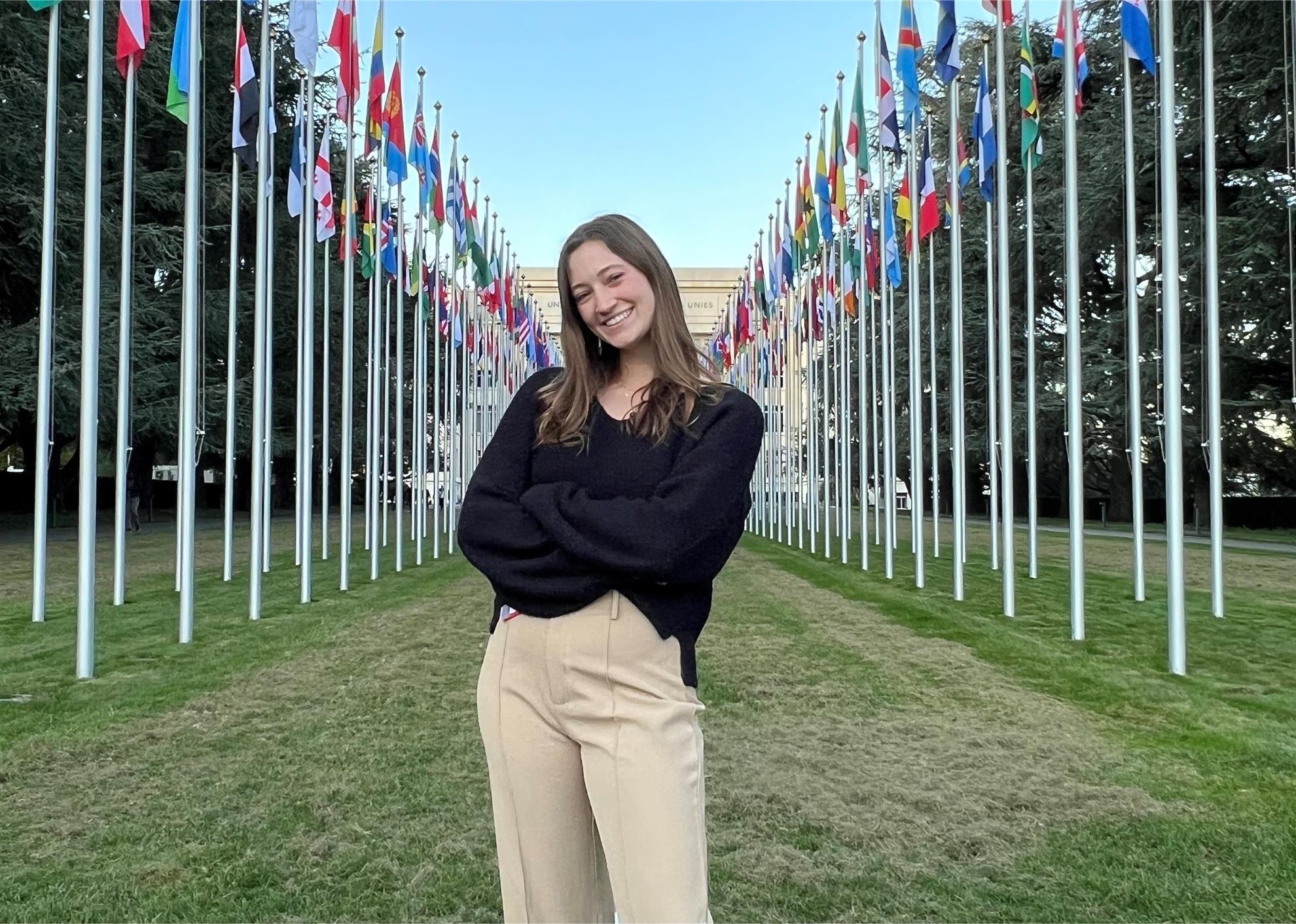
“Hi from Katie Maloan, Rotary District 5840 Global Education Grant Scholar in Geneva, Switzerland!”
Question: What are your impressions of Geneva and Switzerland – the people (fellow students and the Rotarians you’ve met), the vistas, the climate, etc.
I’ve been surprised by how comfortable Geneva feels. Despite being such a hub for international diplomacy, it’s a pretty small city (around 200,000 people) and there are lots of quiet neighborhoods. Switzerland itself is absolutely stunning! As a hiker and a newly-minted skier, I’ve loved challenging myself on the mountains in every season so far. Geneva can be a bit gloomy, but when the sun is out, you can see from my apartment window across Lake Geneva to Mont Blanc in France! One of my favorite parts of the city is the fact that it’s full of international people. At school, in church, on the train, and at Rotary meetings, I’m surrounded by people whose backgrounds are completely different from mine, yet we share the same experiences of moving to another country. This is a great way to learn so much about the world and helps the expat experience not feel as lonely as it might elsewhere.
Question: Is your graduate studies (International and Development Studies) experience what you expected – compare and contrast with your undergraduate experience.
My program at the Graduate Institute is brand-new, a combination of two previously existing courses of study. The Institute is still refining that new curriculum, which meant that our introductory courses in the first semester weren’t everything I had hoped they would be. My classes were much larger and more basic than I had anticipated for graduate school. Despite this initial disappointment, I’ve found many things to enjoy about the Institute’s connections and proximity to Geneva’s international organizations—we have amazing speakers come for events nearly every week and many of our professors are also leading practitioners in their fields. My friendships with classmates, of course, have made this easier, too! The second semester is shaping up to be very exciting as I’m working on applied research project with two other students: we’ll spend six months analyzing the connections between conflict, mineral extraction, and sexual violence in the Democratic Republic of the Congo. This is in partnership with a prominent hospital and human rights advocacy foundation based in the heart of Congo’s most war-afflicted area. I’m looking forward to all of the experience this will offer.
Question: Geneva is such an international city – have you had interesting or surprising experiences you would like to share?
One of my favorite moments so far was producing a podcast about the collapse of the Syrian health system for my human rights class last semester. That experience taught me so much about podcasting, but the best part was that we were able to interview top experts from Doctors Without Borders (MSF), the Office of the High Commissioner for Human Rights, and the International Committee of the Red Cross. Securing these interviews was a real lesson in the value of cold calls! I’ve also loved taking class trips to events at the United Nations.
Question: Several languages are spoken in Switzerland – how has your language proficiency increased?
Geneva is primarily French-speaking, but most people, especially at the Graduate Institute, speak English fluently. It’s easy to stay in an English-speaking bubble, but I work to get out of that and practice my French as much as I can, whether through classes at the local university, language exchanges, or just conversing with my French-speaking friends from school.
Question: Have you been able to visit your Rotary Host Club for a meeting or visit with the Rotaract Club – if so, what impressions did you take away?
I’ve been to a meeting with my Rotary Host Club and to the meeting of a neighboring club that hosts other scholars. Both Clubs have been welcoming and full of laughter. I’ve been struck by the international makeup of Rotary Clubs in this part of Switzerland, which I think helps them relate better to foreign scholars like me. I have also been impressed by the Geneva Internationals’ dedication to providing aid to Ukraine—my contact at the club has traveled to Eastern Europe several times in the last year to help identify and fulfill needs relating to the conflict.
Question: In a few months you will complete your first year of studies – what are your plans going forward?
Since my degree program is two years, I’m working to secure an internship in Geneva over the summer to gain experience working in its international context. Next fall, I will get to delve deeper into my studies with elective courses before I begin preparing for my thesis in the spring semester. Since I can also receive academic credits for internships, I would love to try to find a part-time role while I write my thesis so that I can maximize my time in Geneva and prepare for a job after graduating. I’m also looking forward to refining my skiing skills next year!
Question: In closing, what would you say to encourage other students who have completed their undergraduate degree and want to do graduate studies abroad?
I would absolutely recommend that other students take the opportunity to study outside of the U.S.. Even though it can, of course, be stressful and lonely at times, this experience has broadened my worldview and given me so much self-confidence! Graduate school offers the opportunity to learn about your field, but doing it in a new context also teaches you about yourself. I have a new, deeper understanding of other peoples’ experiences that I may not have understood otherwise. I want to sincerely thank Rotary District 5840 for your support in pursuing this opportunity to grow and learn here in Switzerland.